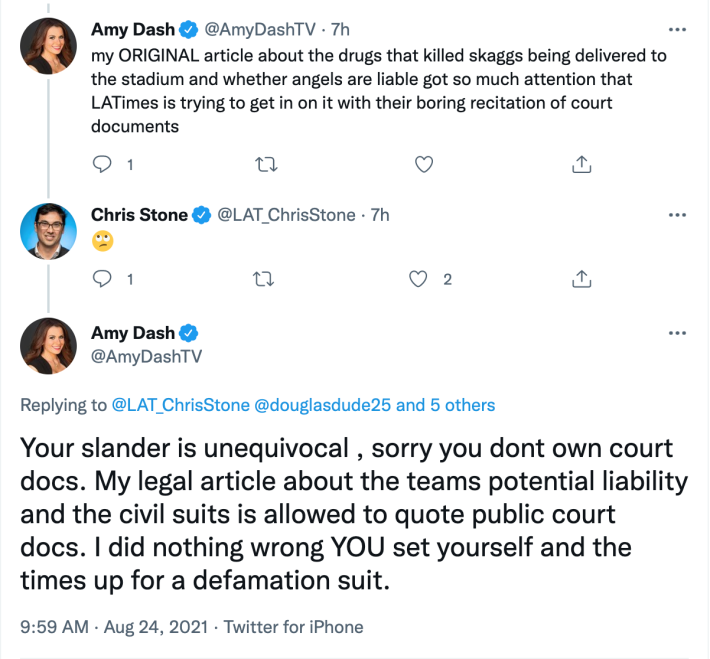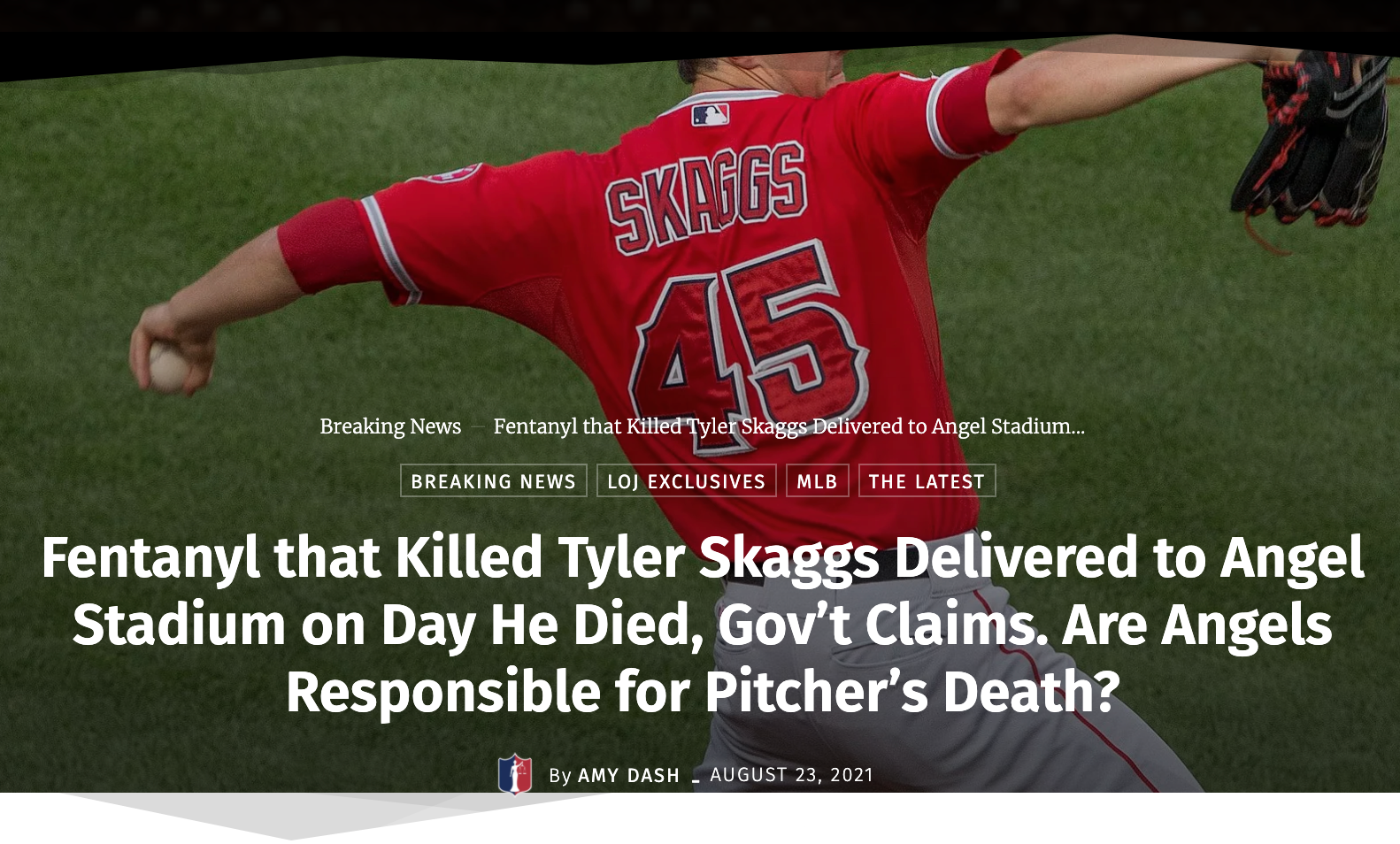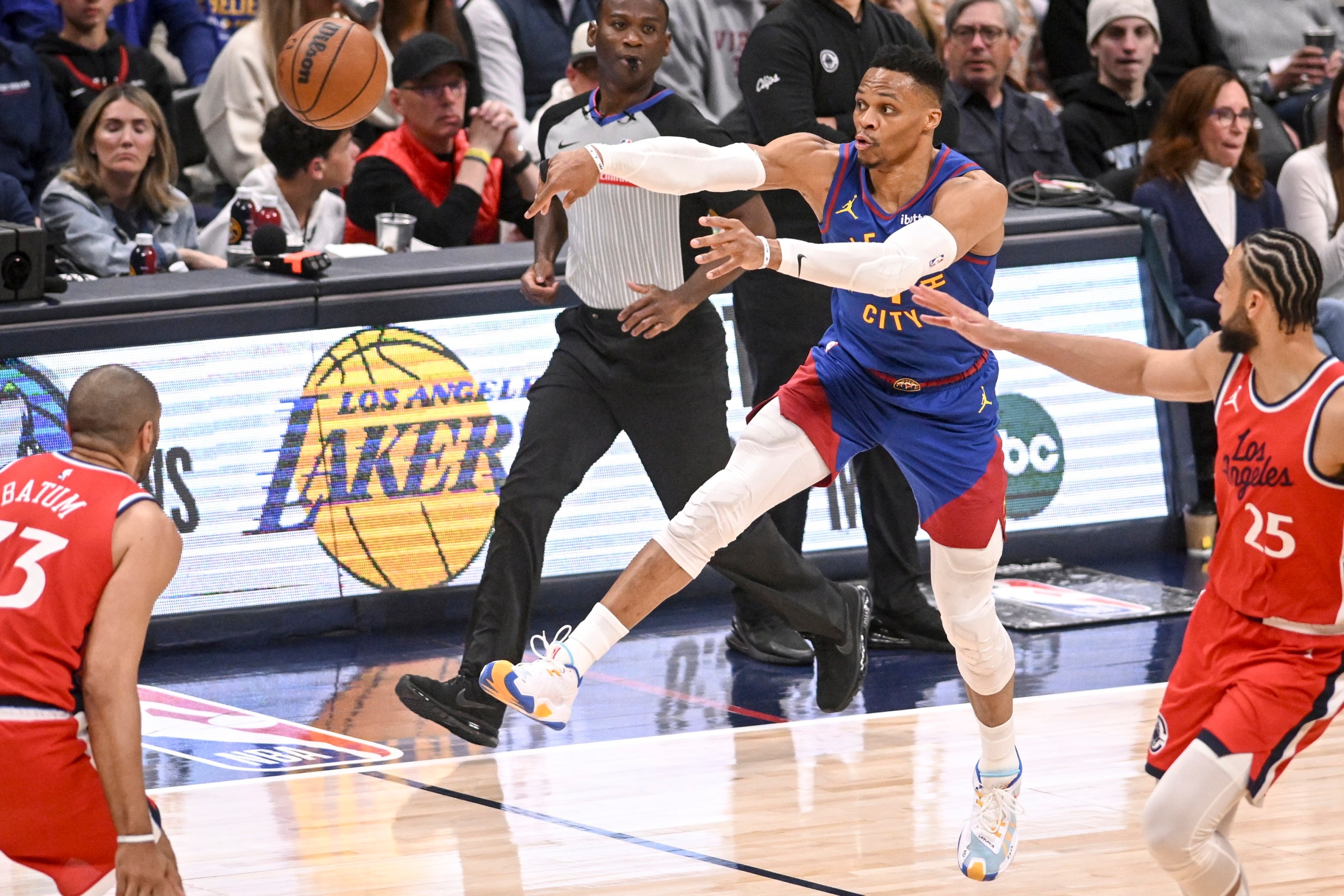The Los Angeles Times reported Friday afternoon (ET) a series of revelations made public via documents filed by prosecutors handling the indictment of ex-Angels communications director Eric Kay, related to the 2019 death of pitcher Tyler Skaggs. Among the revelations: Testimony from "approximately" five MLB players who claim to have received oxycodone from Kay will be presented at trial; Skaggs is accused of shopping for oxycodone on online auction sites and on at least one occasion of receiving a shipment of drugs at the Angels' stadium; and prosecutors say that on more than one occasion Kay offered tickets and memorabilia in exchange for illicit drugs. The Times report, with the headline "Ex-Angels employee charged in Tyler Skaggs’s death supplied players with drugs, feds say," fits neatly into a common and useful category of journalism: a reporter poring through public documents, parsing out the newsworthy bits, and translating them into plain English for readers who would otherwise run aground on a given court filing's dense and dry legalese.
Then, Monday morning, a small and new website called League of Justice published a similar summary of the same court filings, evidently the result of the same document-parsing process, with the headline "Fentanyl that Killed Tyler Skaggs Delivered to Angel Stadium on Day He Died, Gov’t Claims. Are Angels Responsible for Pitcher’s Death?" Its author, Amy Dash, chose to foreground the receiving of drugs at the stadium and the possible legal or civil liability of the Angels organization, and the content is broken up by helpful little subheadings. The information in this blog is largely identical to the Times blog; given that it was published 72 hours later, there's no immediately obvious reason it couldn't be an aggregation. It's therefore possible to see Dash's use of the word "Breaking" in this tweet about her blog as at least a little bit sweaty and overstated:
Breaking: Fentanyl that Killed Tyler Skaggs Delivered to Angel Stadium on Day He Died, Gov't Claims. Are Angels Responsible for Pitcher's Death? | LEAGUE OF JUSTICE https://t.co/BJyDkfUPug
— Amy Dash (@AmyDashTV) August 23, 2021
This journalistic faux pas—the use of words like "breaking" or "sources" to juice up marginally different presentations of information that has already been made public, however legitimate and hard-won the vector to this or that reporter or publication—is both drearily common and also not generally the sort of thing that you or I will give too much of a shit about. In this case—perhaps because the Times story dropped on a Friday afternoon and Dash's was published Monday morning—Dash's story gained a lot more traction on Twitter, benefited from a couple thousand retweets, and drew the attention of those responsible for the Times story. One of those people, executive sports editor Chris Stone, decided to register a public objection:
This story was broken by @nathanfenno @latimessports three DAYS before this was passed off as and repeatedly reposted, inexplicably, as someone else's work. This should be taken down immediately. CC: @FoxSportsRadio @CBSSportsRadio
— Chris Stone (@LAT_ChrisStone) August 24, 2021
Nathan's story: https://t.co/ZXUaDt8Ky2 https://t.co/2JIJq3zSnK
Before we get to the meat of this blog, which is the hellacious flame war that exploded from Stone's Twitter scolding, we should talk for a moment about the two stories. Defector spoke over the telephone with Amy Dash Tuesday afternoon. It was a long and intense conversation, mostly because Dash, currently traveling on vacation with her family, is super pissed-off about having been publicly accused of acting unethically by the executive sports editor of the Los Angeles Times. Dash insisted to Defector that the League of Justice story published Monday morning was the result of her own legwork, including a thorough examination of last week's court filing, an examination of an affidavit filed by federal authorities, a fresh look at the original complaint, access to documents from civil suits filed by Rusty Hardin (representing the Skaggs family), and several telephone calls to "people in the government." Why all that effort should've yielded a story with substantially the same information is unclear, but also possibly beside the point: Dash is adamant that at no point did she reference Nathan Fenno's Times story in reporting her own, and because the court documents are all public, there's no particularly compelling reason to suspect otherwise. League of Justice even blipped Fenno's story on their website, with attribution, on Saturday, although Dash says that was handled by an intern and she herself had not read more than the headline of Fenno's summary until after publishing her own Monday morning.
By Dash's version of events, it was her legal background, keen eye for story angles, absolute editorial independence, and significant legwork that made it possible for her to tease out and emphasize the potential liability of the Angels organization in the Kay case. This seems reasonable enough, even if it's not totally convincing: Fenno's story in the Times includes both the government's assertion that Kay took delivery of potentially laced oxycodone at Angels stadium the day of Skaggs's overdose, and information about the Skaggs family suing the Angels for their role in the events that they say led to Tyler's death. It's hard not to interpret Dash's defense as essentially that she was uniquely positioned to think that this particular angle of the story was the more newsworthy one, but maybe there's something to that: In defense of the journalistic value of foregrounding a different facet of the prosecution's filing, Dash points to a Monday afternoon Newsweek aggregation of the Kay case which references both the Times story and her story, for their distinct points of emphasis.
Form your own opinions about this stuff! I am not here to tell you whether I thought this detail was more interesting than you did is worthy of a "LOJ Exclusive" tag. I am here to tell you that there was a way this type of thing might've been handled in the pre-social media era, and then there's this:

look their article citing court docs and focused on mlb players testifying (which i promoted when it came out) got zero likes and retweets as of last night. When my new legal angle was retweeted over 1500 times they came after me pic.twitter.com/nCRaAsnB2E
— Amy Dash (@AmyDashTV) August 24, 2021
@LAT_ChrisStone is so unprofessional put the Times in jeopardy by defaming me and is actually the libelous one, so ironic. Sorry that Times does not own federal legal documents from the govt & sorry my angle and reporting & writing blew yours out of the water
— Amy Dash (@AmyDashTV) August 24, 2021



These sorts of tiffs, over who is or isn't being properly credited for their work and who gets to claim spiritual ownership over a Big Story, are very common in journalism, mostly because journalists are vain little babies. But they usually unfold in private, via petty emails and direct messages, and when they do break containment into the public sphere, one side is usually all too eager to put out a fire by tweeting something like, "And of course my report would not have been possible without the LA Times' reporting from three days ago. So kudos to them!" But that's boring! If nothing else, you have to respect Dash's appetite for feuding. Here is a person who received a snooty but easily brushed-off complaint about the framing of her report, and then immediately started threatening legal action and firing off heaters like, "So jealous you want to defame me and get sued wow." I'm tempted to do my own summarizing of these court documents, pick out a marginally distinct headline, and start launching missiles of my own. The heat is on!
I asked Dash whether she'd ever heard of the Streisand Effect. She had not, but emphasized that as the founder of a brand new site with fewer than a thousand Twitter followers, she feels she can't afford to silently tolerate accusations of underhandedness from members of the media establishment. Fair enough! It's very funny to me that this dispute essentially revolves around the use of the word "breaking," and has so quickly escalated to the By God I Will Destroy You level of all-out warfare.






